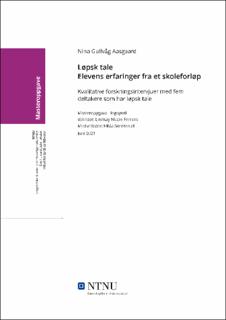| dc.contributor.advisor | Ferrara, Lindsay Nicole | |
| dc.contributor.advisor | Sønsterud, Hilda | |
| dc.contributor.author | Aasgaard, Nina Gullvåg | |
| dc.date.accessioned | 2021-09-28T17:28:37Z | |
| dc.date.available | 2021-09-28T17:28:37Z | |
| dc.date.issued | 2021 | |
| dc.identifier | no.ntnu:inspera:80372130:23727500 | |
| dc.identifier.uri | https://hdl.handle.net/11250/2784409 | |
| dc.description.abstract | Bakgrunn og formål: Løpsk tale er en kommunikasjons- og taleflytvanske som det kan være utfordrende å identifisere og som ofte opptrer i sammenheng med andre tilleggsvansker, som for eksempel stamming. Det finnes lite evidensbasert forskning på fagfeltet løpsk tale, og dette skyldes blant annet at det fremdeles ikke finnes en entydig og empiribasert definisjon av vansken. Det er lite kjennskap til vansken både blant fagpersoner og i befolkningen generelt. Dette kan medføre at elever kan gå gjennom hele skoleforløpet uten at den løpske talen blir fanget opp. På bakgrunn av dette valgte jeg denne problemstillingen:
Hvordan opplever personer med løpsk tale møtet med skolehverdagen? Hva slags type støtte har fungert og hvordan mener deltakerne det er viktig å bli møtt av lærere og logopeder?
Metode: For å finne svar på denne problemstillingen, valgte jeg en kvalitativ forskningsstudie med fenomenologisk tilnærming. Fem deltakere med løpsk tale har deltatt i semistrukturerte intervjuer. Intervjuene ble gjennomført digitalt på Teams og datamaterialet ble transkribert, systematisert og kodet ved hjelp av analyseverktøyet NVivo. Deretter ble det foretatt en tematisk analyse. Analysen og drøftingen presenteres i fire deler: deltakernes opplevelse av skoleforløpet, deltakernes møte med lærere og logopeder i skoleforløpet, deltakernes håndtering av vansken og deltakernes tips og råd til elever, lærere og logopeder. Deltakernes bidrag drøftes i lys av nye læreplaner i norsk skole (Kunnskapsløftet 2020), med særskilt fokus på muntlige ferdigheter og retorikk, Verdens helseorganisasjons klassifikasjonssystem ICF-CY (World Health Organization [WHO], 2007) med fokus på fungering og deltakelse hos personen med løpsk tale, samt teorien om salutogenese (Antonovsky, 2012), med fokus på opplevelse av sammenheng i tilværelsen.
Resultater: Deltakerne forteller om få sosiale og faglige utfordringer i skoleforløpet. Ved forberedte muntlige fremføringer opplevde flere deltakere stor grad av mestring, mens uforberedte fremføringer og spontane muntlige samtaler i større grad var utfordrende. Den løpske talen ble i liten grad tatt tak i av lærerne de møtte i løpet av grunnskolen. Ingen av deltakerne fikk konstatert løpsk tale i barneskolealder. Fire deltakere fikk diagnosen løpsk tale av logoped i løpet av ungdomsskolen eller videregående skole, mens en deltaker fikk diagnosen i voksen alder. Flere deltakere fremhever viktigheten av fleksibel logopedhjelp, samarbeid med foresatte, arbeid med aksept og åpenhet om vansken. Flere deltakere forteller at selvbevissthet har økt og sosial mestring har bedret seg i takt med alder og utvikling. Et av rådene deltakerne gir til lærere og logopeder er å la eleven med løpsk tale bli hørt og få mulighet til å delta og få være en aktiv part i sitt eget skoleforløp. | |
| dc.description.abstract | Background and purpose: Cluttering is a communication and speech fluency disorder that can be challenging to identify, and it is often coexistent with other additional disorders, such as stuttering. There is little evidence-based research on cluttering, and this is partly due to the fact that there still is no definitive or empirically-based definition of the disorder. Cluttering is not well known either among professionals or in the general population. As a result, students may go through their school years without being diagnosed as clutterers. Based on this, I chose the following research question:
How do people who clutter experience everyday school life? What kind of support has been helpful and what advice do these participants have on how clutterers should be met by teachers and speech and language therapists (SLTs)?
Method: In order to answer the research question a qualitative research study with a phenomenological approach was undertaken. Five participants who clutter participated in semi-structured interviews. The interviews were conducted and recorded digitally on Teams, and the data material was transcribed, systematized and coded using the analysis tool NVivo. Thereupon, a thematic analysis was performed. The analysis and discussion are presented in four parts: the participants’ experiences during their school years, the participants' interaction with teachers and SLTs during their school years, the participants way of handling the disorder and the participants' tips and advice to students, teachers and SLTs. The participants' contributions are discussed in light of new curricula in Norwegian schools (Kunnskapsløftet 2020), with special focus on oral skills and rhetoric, the World Health Organization classification system ICF-CY (WHO, 2007), with focus on functioning and participation of the person who clutters, and the theory of salutogenesis (Antonovsky, 2012), focusing on the experience of coherence in life.
Results: The participants mentioned few social and academic challenges occurring during their school years. In prepared oral presentations, several participants experienced a high level of mastery, while unprepared presentations and spontaneous oral conversations were more challenging. Cluttering was addressed only to a small extent by the teachers they met during primary school. None of the participants were diagnosed with cluttering while in primary school. Four participants were diagnosed with cluttering by an SLT during middle school or high school, and one participant was diagnosed in adulthood. Several participants emphasized the importance of flexible speech therapy, collaboration with parents, and work with acceptance and openness concerning the disorder. Several participants reported that self-awareness increased, and social coping improved with age and development. One piece of advice the participants wanted to give to teachers and speech therapists is to listen to students who clutter and give them the opportunity to participate and be active in their own education. | |
| dc.language | nob | |
| dc.publisher | NTNU | |
| dc.title | Løpsk tale. Elevens erfaringer fra et skoleforløp
Kvalitative forskningsintervjuer med fem deltakere som har løpsk tale | |
| dc.type | Master thesis | |
